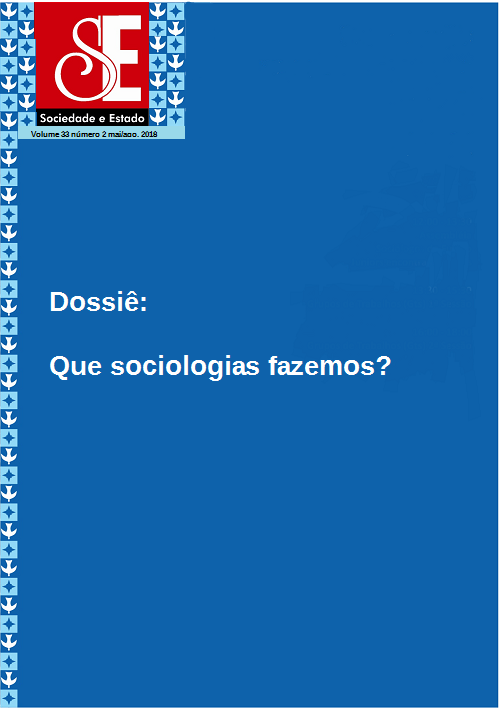A teoria do novo individualismo
DOI:
https://doi.org/10.1590/s0102-699220183302009Palavras-chave:
Novo individualismo, Individualização reflexiva, Tecnologias do eu, Transformações globaisResumo
Neste artigo busco atingir dois objetivos principais: primeiro, examinar e reiterar a teoria de um “novo individualismo” que detalhei em escritos recentes de teoria social. Afirmo que hoje presenciamos as condições e consequências de um novo individualismo que varre o mundo e que se evidencia especialmente na nova economia financista das indústrias de mídia e comunicação. Então pergunto: como a teoria do novo individualismo difere de outros pontos de vista influentes na teoria social recente? Para os propósitos deste artigo, os pontos conceituais de comparação com a teoria do novo individualismo serão (a) a teoria das “tecnologias do eu”, conforme elaborada por Michel Foucault e vários neofoucaultianos; e (b) a noção de “individualização reflexiva” delineada por Anthony Giddens. Em segundo lugar, discutirei ramificações sociológicas mais amplas da nova tese sobre o individualismo. O novo individualismo, argumentarei, não se refere meramente a indivíduos ou a suas disposições psicológicas; em vez disso, penetra até o cerne do núcleo da cultura e da vida institucional. Novo individualismo é, portanto, uma espécie de taquigrama para vários processos que moldam, e que são moldados, pelas transformações sociais globais. Os principais condutores institucionais do novo individualismo sobre os quais vou dissertar são (a) reinvenção contínua, (b) mudança instantânea, (c) velocidade e (d) o curto prazo, ou episodicidade. Concluo tecendo considerações sobre as prováveis consequências sociológicas futuras do viver-se a vida na via expressa do novo individualismo.
Tradução: Solange Miguel Marcondes Armando
Downloads
Referências
BAUMAN, Z. Liquid Life. Cambridge (UK): Polity Press, 2005.
BECK, U.; GIDDENS, A.; LASH, S. Reflexive modernization. Cambridge (UK): Polity Press, 1994.
DELILLO, D. Underworld. London: Picador, 1998.
THE ECONOMIST. Reshaping Cisco: the world according to Chambers. The Economist, 27 Aug. 2009.
ELLIOTT, A. Reinvention. London: Routledge, 2013.
---- . The new individualism after the great global clash. The Journal of Studies in Contemporary Sociological Theory, v. 4, p. 55-66, 2010.
---- . Contemporary social theory: an introduction. London: Routledge, 2009.
---- . Making the cut: how cosmetic surgery is transforming our lives. Chicago (IL): University of Chicago Press, 2008.
---- . Concepts of the self. 2. ed. Cambridge (UK): Polity Press, 2007.
---- . Subject to ourselves. 2. ed. Boulder (CO): Paradigm Press, 2004.
ELLIOTT, A.; LEMERT, C. The global new individualist debate: three theories of individualism and beyondi. In: ELLIOTT, A.; GAY, P. du (Eds.). Identity in question. London: Sage, 2009a.
---- . The new individualism: the emotional costs of globalization. 2. ed. London: Routledge, 2009b.
ELLIOTT, A.; URRY, J. Mobile lives. London: Routledge, 2010.
ERIKSEN, T. Tyranny of the moment. London: Pluto Press, 2001.
FOUCAULT, M. Governmentality. In: BURCHELL, G. et alii (Eds.). The Foucault effect. London: Harvester Wheatsheaf, 1991.
GIDDENS, A. Runaway world: how globalisation is reshaping our lives. New York: Routledge, 2003.
---- . Modernity and self-identity: self and society in the Late Modern Age. Cambridge (UK): Polity Press, 1991.
---- . The consequences of modernity. Cambridge (UK): Polity Press, 1990.
GROSSMAN, G.; ROSI-HANSBERG, E. The rise of off-shoring: it’s not wine for cloth anymore. The New Economic Geography: Effects and Policy Implications: A Symposium. Kansas City (MO): Federal Reserve Bank of Kansas City, 2006.
HAIKIO, M. Nokia: the inside story. Boston (MA): Prentice Hall, 2002.
HELD, D. Democracy, the nation-state and the global system. Economy and Society, v. 20, n. 2, p. 138-172, 1991.
HELD, D.; MCGREW, A.; PERRATON, J.; GOLDBLATT, D. Global transformations. Cambridge (UK): Polity Press, 1999.
KUNDERA, M. Slowness. New York: HarperCollins, 1995.
LASH, S.; URRY, J. Economies of signs and space. London: Sage, 1994.
MERRIDEN, T. Business the Nokia way: secrets of the world’s fastest moving company. Oxford (UK): Capstone, 2001.
RIESMAN, D., GLAZER, N.; REUEL, D. The lonely crowd - Revised edition: a study of the changing American character. New Haven (CT): Yale University Press, 2001.
ROSA, H. Social acceleration: ethical and political consequences of a desynchronized high-speed society. Constellations, v. 10, n. 1, p. 3-33, 2003'.
ROSE, N. Powers of freedom. Cambridge (UK): Cambridge University Press, 1999.
---- . Inventing our selves: psychology, power and personhood. Cambridge (UK): Cambridge University Press, 1996.
---- . Governing the soul: the shaping of the private self. London: Routledge, 1990.
SCHEUERMAN, W. E. Busyness and citizenship. Social Research, v. 72, n. 2, p. 447-470, 2005.
SENNETT, R. The culture of the new capitalism. New Haven (CT): Yale University Press, 2005.
---- . The corrosion of character. New York: Norton, 1998.
SOROS, G. The crisis of global capitalism: open society endangered. New York: Public Affairs, 1998.
VIRILIO, P. Speed and politics. New York: Semiotext(e), 1986.











